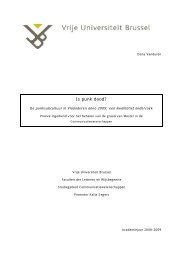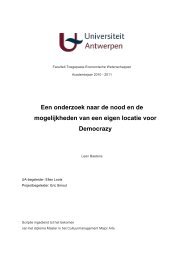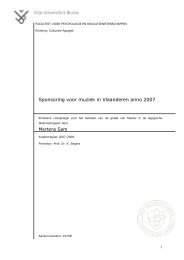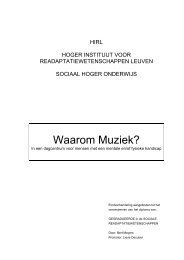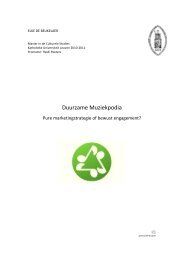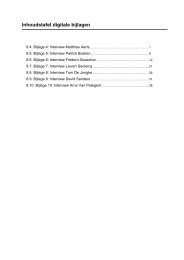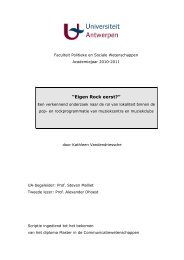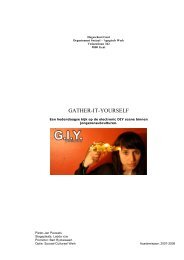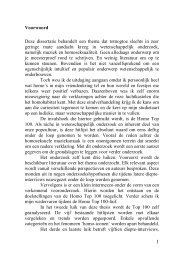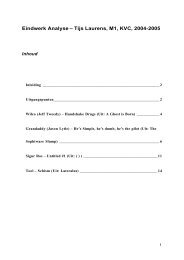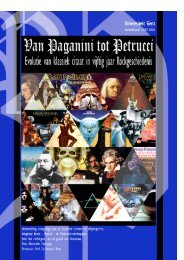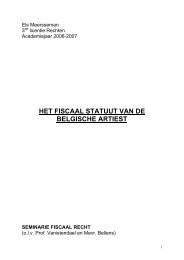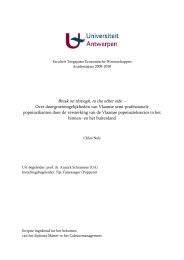Hip hop identity in a township reality. - Poppunt
Hip hop identity in a township reality. - Poppunt
Hip hop identity in a township reality. - Poppunt
Create successful ePaper yourself
Turn your PDF publications into a flip-book with our unique Google optimized e-Paper software.
For example somebody can be a strict and serious person at his workplace, but if<br />
he comes home he becomes the clown of the house. He can <strong>in</strong>dicate and display<br />
these separate personalities or roles to his surround<strong>in</strong>g environment by us<strong>in</strong>g<br />
different types of speech. When he has to give out orders at work, he will use short<br />
sentences and an authoritative style but when he is at home he makes jokes and he<br />
uses dim<strong>in</strong>utives to talk to his kids. Speakers have the ability, demonstrated by<br />
their <strong>in</strong>teractional behaviour, to choose a section of their l<strong>in</strong>guistic repertoire for a<br />
variable time span, to accomplish speak<strong>in</strong>g activities. Throughout the course of an<br />
<strong>in</strong>teraction the focus can change several times, and speakers can play different<br />
roles. The focus is thus variable, it can be functionally controlled and it can be used<br />
to give mean<strong>in</strong>g <strong>in</strong> a specific social context. When one produces monol<strong>in</strong>gual<br />
speech, that is called hav<strong>in</strong>g a monofocus of attention. When one uses codeswitch<strong>in</strong>g,<br />
that is a dual focus (Francesch<strong>in</strong>i: 61-62).<br />
The matter of <strong>identity</strong> does not only refer to the <strong>identity</strong> of one sole person.<br />
Language and the phenomenon of code-switch<strong>in</strong>g can also be used to express group<br />
<strong>identity</strong>. We need to mark here that the reference to the peer group is more<br />
important than the reference to a national, ethnic or l<strong>in</strong>guistic def<strong>in</strong>ed <strong>identity</strong>.<br />
When you speak a certa<strong>in</strong> sort of slang or jargon, that is some k<strong>in</strong>d of proof that<br />
you belong to a specific group from which that slang or jargon is a feature. For<br />
example when somebody uses a lot economical terms, that person is most likely to<br />
have a job <strong>in</strong> that particular sector.<br />
For which function our <strong>in</strong>terviewees use code-switch<strong>in</strong>g, will be discussed <strong>in</strong> the<br />
practical part of this chapter. We will conclude the theoretical section with a short<br />
account on the phenomenon of ‘cross<strong>in</strong>g’.<br />
Cross<strong>in</strong>g<br />
The term ‘code-cross<strong>in</strong>g’, or simply ‘cross<strong>in</strong>g’ was <strong>in</strong>troduced by Rampton <strong>in</strong> the<br />
first edition of his book ‘Cross<strong>in</strong>g. Language and ethnicity among adolescents’<br />
(1995). To start our explanation about cross<strong>in</strong>g, we refer to the def<strong>in</strong>ition Rampton<br />
provides:<br />
“The term ‘language cross<strong>in</strong>g’ (or ‘code-cross<strong>in</strong>g’) refers to the use of a<br />
language which isn’t generally thought to ‘belong’ to the speaker. Language<br />
cross<strong>in</strong>g <strong>in</strong>volves a sense of movement across quite sharply felt social or



